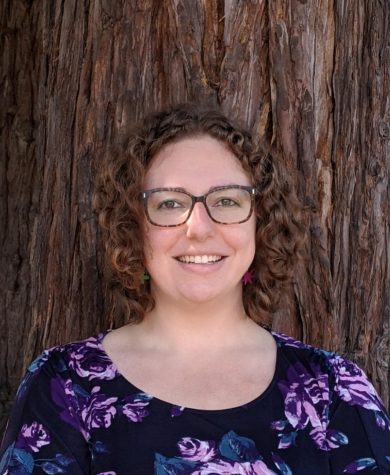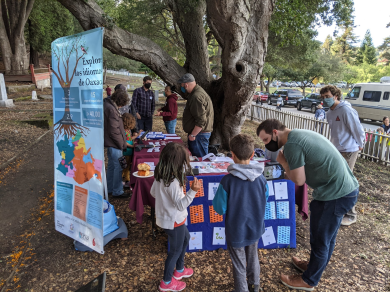 Maya Wax Cavallaro is a PhD student in the Linguistics Department at UC Santa Cruz. Wax Cavallaro studies the Mesoamerican languages Tz’utujil (Mayan) and Santiago Laxopa Zapotec (Oto-Manguean) and specifically focuses on the sounds of these languages. As Wax Cavallaro explains, “fieldwork with minoritized and understudied languages is essential to understanding linguistic structure, typology, and universals.”
Maya Wax Cavallaro is a PhD student in the Linguistics Department at UC Santa Cruz. Wax Cavallaro studies the Mesoamerican languages Tz’utujil (Mayan) and Santiago Laxopa Zapotec (Oto-Manguean) and specifically focuses on the sounds of these languages. As Wax Cavallaro explains, “fieldwork with minoritized and understudied languages is essential to understanding linguistic structure, typology, and universals.”
In November, we reached out to get some more information on her ongoing project. Wax Cavallaro was a 2021-21 THI Summer Research Fellow and plans to use the funds from this fellowship to conduct fieldwork in Oaxaca, Mexico.
Greetings, Maya! Thank you so much for chatting with me. To get us started off, could you explain for a general audience what you are currently researching and writing on?
My pleasure! My research focuses on phonology and phonetics, which means I am interested in language sounds: their organization, structure and rules in the minds of speakers and listeners, as well as how they are produced and perceived. (I should note that sign languages have phonetics and phonology as well, which does not involve sounds, but my research focuses on spoken languages.)
I am currently working with two Mesoamerican languages: Tz’utujil (Mayan) and Santiago Laxopa Zapotec (Oto-Manguean). My time living in Guatemala and meeting people who speak and create art in Mayan languages played an important role in leading me to the field of linguistics. I think that fieldwork with minoritized and understudied languages is essential to understanding linguistic structure, typology and universals. I am also very interested in collaborative and community-based linguistic research. I want to make sure I am giving back to the communities with whom I work, not just taking.
My THI-funded research is looking at the tonal system of Santiago Laxopa Zapotec (SLZ), a language spoken by roughly 1300 people, mainly in Oaxaca, Mexico. This is part of a collaborative project with two of my colleagues in the linguistics department, Mykel Brinkerhoff (also a THI summer research fellow) and Jack Duff. SLZ is a tonal language, meaning that relative pitch (high, mid, low) provides lexical and grammatical meaning. SLZ also features four vowel phonation types. Vowels can be distinguished not just by quality (/e/ vs. /a/) but also by the laryngeal configurations with which they are produced (breathy, checked, creaky, modal). My colleagues and I also believe that, separate from tone and phonation types, SLZ may have word stress. It is typologically rare for a language to have all three of these, so this work on SLZ is important to our field’s understanding of prosody and the interactions between stress and other phonological phenomena.
Your work sounds very interesting! Do you think that the linguistic questions you are grappling with are significant to and reflect the historical and political circumstances of the speakers you learn from? How so?
What a question! I think there are a lot of things I could say here and I’m not really sure where to start, but my short answer is, ‘yes.’ Sometimes the linguistic questions I am grappling with feel very abstract and theoretical, but language does not exist in a vacuum. Language is used by people in communities. Historical and political factors affect the languages themselves, as well as, certainly, our understanding of language as a field.
In this particular work, for example, we might wonder how the tonal system of SLZ managed to develop differently from that of other—even closely-related—languages. SLZ has a different number of tonal registers and patterns from what has been described in neighboring languages. Historical, political, social, and even geographic factors can play a role in shaping languages. The majority of linguistic work has looked at only a small percentage of the world’s languages, often languages of power and prestige due to imperialism and oppression. We need to look to minoritized and understudied languages if we truly want to be able to understand the diversity of human language. I also like to believe that this type of work can help to dismantle the common misconception that there is something linguistically superior about languages like English or Spanish.
You mentioned that you work with local Santa Cruz residents and community organizations like Senderos. Could you tell us more about your community work?

Día de los Muertos community celebration with posters and games exploring the languages of Oaxaca.
I am very happy that our department makes a point to focus on collaboration and giving back. Nido de Lenguas is our partnership with Senderos, which is an amazing nonprofit here in Santa Cruz, serving the Latino/Latinx community through arts and education. THI has also been very supportive of our work with Senderos (you can read about the work Kelsey Sasaki and Andrew Hedding have done as THI Public Fellows). Through Nido de Lenguas, we set up tables at community events to provide information about (and games in) indigenous languages of Oaxaca. We also organize language workshops and classes that anyone can attend.
I have recently begun participating in the Senderos Ensamble Musical, less in my capacity as a linguistics graduate student and more as a Santa Cruz community member. I am really enjoying the opportunity to play music, meet people, and learn.
How does this work in the community contribute to and push forward your own scholarship? How do you imagine that your community engagement mutually benefits the organizations you work with?
There is a long and disgraceful history of linguists (as well as academics in other fields) interacting with language communities in exploitative and harmful ways. I believe strongly that if I am going to study languages and communities I do not belong to, I need to work together with those communities to make sure my work is beneficial, not only to my field and my career, but to the people who are willing to work with me and share their knowledge. Fortunately, faculty and other students in my department share this belief and have already established a relationship with Senderos. As a linguistics department, we have certain skills we can bring to the table, such as creating games and pedagogical materials, sharing information about languages, and manning tables at pop-up events. We also maintain some online resources like a Zapotec dictionary that is meant to benefit both linguists and community members. Recently, we have been talking about ways to give back more to the community in Santiago Laxopa, not just here in Santa Cruz. This might involve creating recordings or pedagogical materials, holding workshops, or other projects.
This is not entirely a moral/ethical matter. The more time one spends with a language community, the better one can understand a language and how it is used. This can absolutely affect the quality of linguistic data and scholarship. Relationships are also important. The better someone knows me, the more likely they are to explain interesting information I might have missed or correct me if I’m making a mistake. As someone who knew no Zapotec two years ago, I rely heavily on the expertise of native speaker consultants for my research, and it is important that we get to know each other. I also really enjoy meeting and connecting with people, so I love fieldwork and community work.
I know you have had to delay field work because of the pandemic. How have linguists like yourself, who often require in-person interaction for research, navigated the challenges of safe social distancing?
It has definitely been frustrating not being able to travel, but I think safety is much more important than collecting data. Many of us, myself included, have been able to do some amount of fieldwork remotely, using video conferencing platforms like Zoom. We also found we could get much higher-quality audio (which is especially important for phonetic and phonological work) using a podcasting platform called Zencastr. One could say that the pandemic has pushed us to innovate and think about the future of technology in fieldwork and remote fieldwork.
Unfortunately, not everyone has access to computers, microphones, or the high-speed internet service necessary for Zoom and Zencastr, and often the communities with whom fieldworkers work are among those without access to that type of technology. We attempted to Zoom with someone in Santiago Laxopa (where most speakers of SLZ live), but could not get an adequate connection.
Fortunately, there are now two people here in Santa Cruz who are native speakers of SLZ and have been willing to work with linguists in our department during these times, first in a Zoom Field Methods class during spring 2020, then through Zoom and Zencastr, and more recently, now that we are all vaccinated and it is safer, in person. When we meet in person, we still work outside and take safety precautions. In order to make claims about the structure of a language, it is necessary to collect data from more than one or two speakers, as individuals all have idiosyncrasies and outside influences. But the ability to continue working regularly with two speakers has allowed us to learn so much about SLZ. We are developing hypotheses we can test when we are able to travel and also improving our ability to hear and produce the sounds and structures of the language. We are also, importantly, maintaining a working relationship with our consultants and a connection to the community.